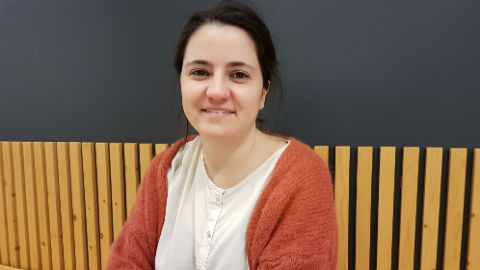"The social and solidarity economies have fared better in this crisis"

01/03/2018
-What relationship do you have with social and solidarity economics?
-I have been working as a social economics technician in several entities and doing research at the Gezki Institute of Cooperative Law. I hold a master's degree in Social Economics from the UPV/EHU and I worked on the project of university as a tool for transformation, as well as being able to include social and solidarity economics into different undergraduate and graduate programmes.
-What is social solidarity economics?
-It is a real alternative to the capitalist economy, which is what reigns in our society today. Economic alternatives and initiatives exist in the consumption, production and services sectors, in which people are the main focus and are more important than the capital.
-What are the experiences of social incubators at universities?
-There are none in Spain. We can focus abroad on the experiences of incubators in Brazil, where they began functioning 20 years ago, at a moment in which the crisis co-existed with a surge in social economics, and at the same time a demand for universities to play a social role and be at the service of society. The first incubator was implemented at the University of Sao Paolo. The initiatives were made by groups of people from different disciplies who came together to offer tools to the people living in the favelas.
For example, the people living in the favelas wanted to create a cooperative, but did not know how, and the university members guided them through the steps. Today there are more than 100 incubators around the country working on social economy projects.
In southern France, in Marseille, a similar project began a few years ago, but outside the university, in which workers offer specific aid to initiatives.
-You are from Gipuzkoa, what types of incubators do you have there?
-There was a twist in the end and it finally did not become a university incubator, because another initiative existed at the University of Mondragon and there wer other regional initiatives, so we decided to put it all together. We created the Koop Fabrika, a regional social incubator. From the university we wanted to create an ecosystem of lecturers who could help in these types of projects, by directing final projects and dissertations. This regional incubator contains collective initiatives, especially from cooperatives, because they are the ones needing the least amount of intial capital. They are formed by people aged 25-40 years, graduates from the Gipuzkoan region. Some offer educational guidance, others are communication companies, others make fresh pasta, there are also groups offering circus workshops, etc.
-What characteristics must these projects have?
-The projects are closely related to the land, most of them are groups with a positive social impact on the area in which they operate, and they have a democratic and horizontal organisation. They must be economically sustainable, although that is not the main objective of these companies. Taking care of the people, of their own workers, is first and foremost (the person comes first).
-How has this movement bahaved during the economic crisis?
-Several studies indicate that social and solidarity economies have fared better during the economic crisis, with less jobs being destroyed. And after the crisis people realised that the other type of economy was unsustainable and that it is not a good way of doing economics.
-Why has this type of economics not spread out to more people?
-Well, it is slowly reaching new people. In fact, I would say it is becoming a trend, for the obvious reasons. But we must be realistic, and we must co-exist with both types of economies.
-What made it clear that society needed such an economic alternative?
-The other day Hernán Còrdova from Ciutat invisible said that we are a frustrated generation, because you think you are going to study something and then conquer the world, with a decent job, and then you realise nothing of that will happen. Many of the people in the KoopFabrika are people who are searching for a different type of life. It is a different way of living, consuming, and working.
-One must be willing to give up a series of securities and conveniences.
-Yes, no one forms part of the social and solidarity economy to become rich. It is a total change in mentality. The road is difficult, but those who form part are convinced of what they are doing, many come from working actively in social movements, and clearly want a different type of lifestyle.
-Did the Basque Country lead this movement?
-Yes, we were the first, but now Catalonia has taken on the lead and is at the head of the movement. All the things currently happening in the Sants district of Barcelona is a model to follow. In fact, we came to Barcelona a week ago to receive training. I am not familiar with all of Catalonia, but Barcelona is a model at social level.